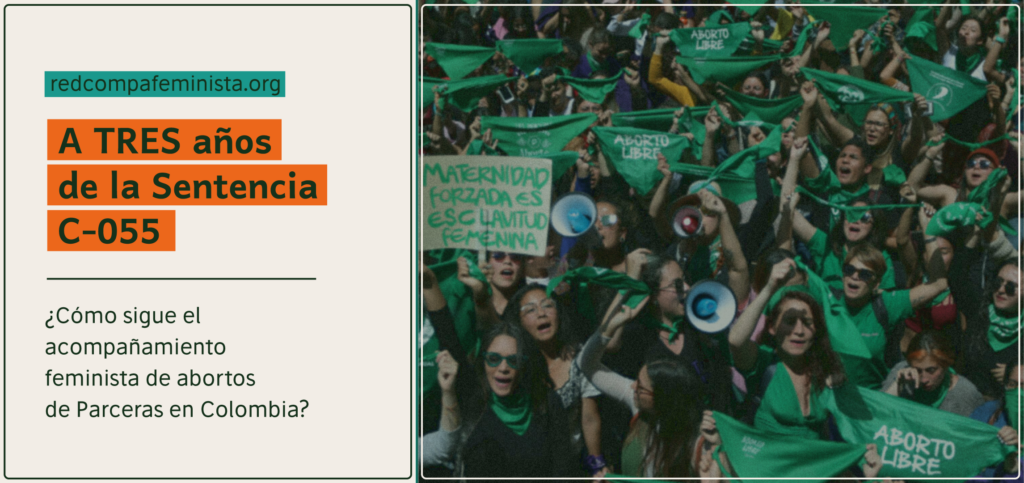How is the feminist abortion accompaniment work of Parceras continuing in Colombia?
In the beginning we had this doubt, in the corner of our head, perhaps, about which was going to be our role in this new moment or new stage of the struggle for abortion, and specifically: our territory. We knew that the Colombian State lacks the institutional strength to be able to guarantee rights in this sense, we were already coming from a less restrictive legal context, unlike other countries in the Region (Latin American and Caribbean). For this reason, regardless of whether or not the Colombian State was in a position to guarantee the rights of the indigenous people, we were already coming from a less restrictive legal context, unlike other countries in the region (Latin American and Caribbean). we were certain that we would continue to provide accompaniment, guaranteeing access to the and positioning our political positions through it.
Three years after the C-055 ruling, and thanks to a greater articulation of organizations, collectives and territorial leadership (along with the era of social networks), we do not depend on weak institutional will, access to information and to the law has been disseminated and guaranteed, facilitating its appropriation.. This has allowed women and AFAN dissidents to recognize abortion as a possibility. The doubts that this new stage brings to our networks have to do with information gaps regarding: how, when, where, do I need permission, costs, etc.
These changes have meant a considerable volume of people coming to our network with a greater freedom to ask questions and feel they have options, obviously we are still fighting against social penalization, but ultimately we are in another place in the conversation.
During these years we have allowed ourselves to ask ourselves how we want to continue this struggle, understanding that it makes it easier for us to have a much closer, more attentive and careful accompaniment.not only with those we accompany, but also with ourselves. We have had the opportunity to hold internal schools, to give space to the debates that the moment requires, we want to grow and strengthen ourselves.
About the social decriminalizationIn the last year, a year and a half, we have been conducting accompaniment workshops for women's networks, trans and non-binary people in different regions of the country, a very valuable process that seeks to share feminist tools for accompaniment, as we understand that they are a point of reference, to which women and people who wish to have an abortion can turn to.
We then address what information is needed, how I can accompany or support this process, to whom I can redirect. On the other hand, we have been in spaces of knowledge exchange with health personnel whose job is to perform abortions.This has been very important, as it has allowed us to strengthen the articulation with those who are advocating for safer and more dignified abortions from the institutional point of view. This experience has allowed us to reflect on the demands of our current context.
One thing that is clear to us is that the institutional system is not (and has not been) prepared to comprehensively receive all women, trans and non-binary people who wish to have an abortion, as they use outdated methods, continue to use curettage or do not use the combined method. Therefore, we will continue to be present here as a sovereign, safe and feminist option.
Ruling C-055 is a ruling issued by the Constitutional Court on February 21, 2022, as a result of a lawsuit filed by the Causa Justa movement.which extends the right to abortion allowing women, girls, trans men and non-binary persons to terminate a pregnancy according to their own reasons and without the threat of imprisonment, up to 24 weeks of gestation. After this period, sentence C-355 of 2006 applies under the three grounds model:
- When the continuation of the pregnancy constitutes a danger to the life or integral health of the woman or pregnant person.
- When there is malformation of the fetus incompatible with extrauterine life.
- When the pregnancy is the result of sexual violence.
We are part of Causa Justa platform in which activists, jurists, doctors, territorial and national organizations share, this has also allowed us to deepen the articulation and territorial needs, but also within the institutions what is needed, also with respect to the setbacks, to be aware of what can happen, what has been requested, there have been a lot of attempts to undermine the progress and none has been able to move forward.
We are clearly expecting the end of this government and what may happen with a government that unfortunately is likely to be right-wing and that also implies recognizing how we can prepare ourselves to face our process and that of others we accompany in a safe and careful way.

